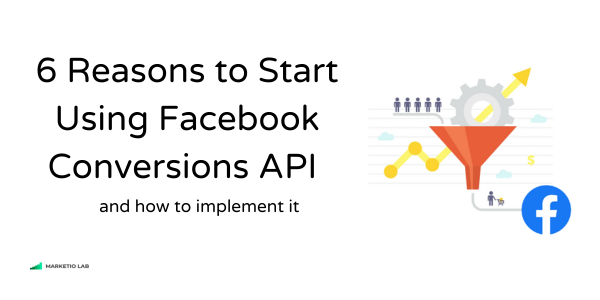
For the past year, Facebook Pixels has been a precious tool most businesses use to track Facebook data. However, its effectiveness has been declining due to various factors including the rise of ad blockers and privacy concerns.
To counter these challenges, Facebook has rolled out the Facebook Conversions API (CAPI). Moving things to the server side for a tougher and more privacy-friendly data tracking game.
Now, with this fresh approach, businesses can shoot encrypted event data straight to Facebook’s servers. Say goodbye to the old-school pixel tracking – we’re leveling up!
Here are 6 reasons why businesses should consider incorporating Facebook CAPI into their marketing strategy:
1. Enhanced Privacy Compliance:
Facebook CAPI is more private-friendly. It lets marketers send secret messages straight to Facebook servers, reducing reliance on outside cookies. This ensures we follow privacy rules and builds trust with users.
2. Improved Data Accuracy:
Unlike the usual cookie-based tracking, Facebook CAPI talks directly from server to server. This means more precise data tracking, especially across different devices and platforms.
3. Mitigating Ad Blocker Impact:
Ad blockers can stop regular tracking tools, making it hard to gather important user data. Facebook CAPI, working on the server side, is less affected by ad blockers. This ensures a steady and complete data collection process, helping businesses refine their ad strategies.
4. Optimized Performance and Faster Loading Times:
With server-side tracking, the heavy lifting is done on the server, not the user’s browser. This leads to faster web page loading times. Better website performance improves the user experience and boosts search engine rankings. Facebook CAPI helps create a smoother online environment for businesses and users.
5. Cross-Device Tracking and Attribution:
In today’s world, users bounce between devices before making a decision. Facebook CAPI tracks this journey by collecting data from server-side actions. This lets businesses link conversions accurately, giving marketers a full picture to improve campaigns.
6. Custom Event Configuration:
Facebook CAPI is flexible. It lets businesses define and send custom events, giving a detailed look at user interactions. This customization allows precise tracking of specific actions on a website or app. Marketers can use this granular data to shape their strategies.
How to Implement Facebook Conversions API:
There are two options to set up CAPI:
1. Partner Integration
No coding is needed for this method. It’s suitable for users on partner platforms like WordPress or similar platforms.
- Go to Events Manager
- Go to the Data Sources tab
- Click Settings
- Scroll down to Conversion API
- Under Set Up Through Partner Integration, click Choose a Partner
- Choose your provider from the options
- Follow the instructions provided for your given partner
2. Manual Integration
This is another way but will require a web developer due to the coding knowledge required for this method.
- Go to Events Manager:
- Click on Add Events and Select Using Conversion API
- Install your code manually
- Click Continue
- Choose the event you want to track and click Continue
- Select the parameters for your event and click Continue
- Click Confirm Setup, then Send Instructions
- Enter your developer’s email address and click Send
The adoption of Facebook Conversions API marks a strategic move towards a more secure, accurate, and efficient approach to data tracking in the ever-evolving landscape of digital marketing. By understanding the benefits outlined above and following the implementation guide, businesses can position themselves for success in the competitive online space, driving meaningful conversions and fostering long-term customer relationships.
Do you need help with Facebook Conversion API? Get a quote today! ->
